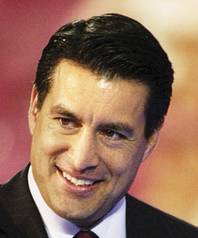Wednesday, March 30, 2011 | 2:01 a.m.

Brian Sandoval

Lynn Warne

John Oceguera
Sun Coverage
Sun archives
- Battle continues in state Legislature over teacher tenure (3-20-2011)
- Are teachers getting tenure too soon? (1-23-2011)
- Similar budget woes prompt Nevada rallies (1-22-2011)
- Hundreds of union workers rally in Las Vegas for bargaining rights (2-21-2011)
- Chancellor backs UNLV president in talk of financial emergency (2-16-2011)
- Wis. governor wants to cut union rights in budget (2-10-2011)
- Regent says it’s time that K-12 shares in budget sacrifice (2-8-2011)
- Sandoval won’t push bill to eliminate collective bargaining (2-4-2011)
- Higher education officials say Sandoval budget cuts a ‘death sentence’ (2-4-2011)
- Education in forefront of upcoming budget battle (1-30-2011)
- Chancellor: University tuition would have to go up 73 percent to cover Sandoval budget gap (1-27-2011)
- A steep climb for Nevadans (1-26-2011)
- Soft words during State of the State hide Nevada in pain (1-25-2011)
- Calls to end teacher tenure are bipartisan (9-23-2010)
- Gibbons wants to reform collective bargaining, though his deputy chief of staff once said he was in pocket of unions on issue (5-10-2010)
As his fellow Republican governors have declared public-employee unions to be public enemy No. 1 and moved to strip their collective bargaining rights, Gov. Brian Sandoval has avoided a similar fight. He has focused instead on the state’s flatlining economy, beleaguered budget and struggling schools.
But Sandoval’s newly unveiled education reform package might bring the collective bargaining fight to him.
Under the legislation, teachers unions couldn’t bargain for higher pay based on educational attainment or years of service. They would also be limited in bargaining on the processes for layoffs, other workforce reductions and termination.
Sandoval’s senior adviser, Dale Erquiaga, said the governor’s intent isn’t to eliminate collective bargaining. But he acknowledged some of those rights could end up as collateral damage in Sandoval’s efforts to end teacher tenure and seniority.
“This isn’t about opening up (Nevada Revised Statute) 288,” Erquiaga said, referring to the statute on collective bargaining. “Our perspective is the policy outcome of ending teacher tenure and first in, last out.”
The Nevada State Education Association sees Sandoval’s bill, Assembly Bill 555, as an end run around its collective bargaining rights.
“We certainly didn’t take the governor at his word that he was not going to mess with collective bargaining,” association President Lynn Warne said. “He said he wasn’t going to move to eliminate collective bargaining, but there’s lots of mischief to be made within the statute of 288. And he’s picked on two very important issues to us.”
Sandoval’s proposal comes as legislators across the political spectrum are proposing bills to make it easier to get rid of bad teachers — widely seen as key to improving schools. Democrats and Republicans are, however, at odds on whether that requires an end to collective bargaining.
Democratic lawmakers, led by Assembly Speaker John Oceguera of Las Vegas, want to end teacher tenure by extending their probationary period and requiring any teacher with more than one unsatisfactory evaluation to be placed on probation. Oceguera’s bill would not change the collective bargaining statutes.
(Teachers in Nevada technically aren’t granted tenure, but they cannot be fired “at will” beyond a one- to two-year probationary period, which both conservative and liberal lawmakers argue is de facto tenure.)
Conservatives argue it’s impossible to end teacher tenure without eliminating rights to collectively bargain on dismissal procedures. Under state law, collectively bargained contracts supersede state law on teachers’ probationary and post-probationary status.
“If you want to end teacher tenure, you kind of have to go after collective bargaining,” state Sen. James Settelmeyer, R-Minden, said.
Sandoval’s bill would repeal the statutes allowing local teacher contracts to supersede state-mandated dismissal procedures.
But Oceguera said that isn’t necessary. Existing law is strong enough to prevent an arbitrator from siding with the teachers union on a contract that goes beyond the policies his bill seeks to establish. School districts wouldn’t agree to such provisions anyway, he said.
“I just think it’s highly unlikely that the districts would say, ‘Oh, yeah, we’ll give on that,’ ” Oceguera said.
Yet, conservatives note that’s what districts have done in some cases.
State law requires districts to share the cost of employee retirement contributions. But unions have negotiated terms forcing districts to bear 100 percent of that cost — another practice Sandoval seeks to end.
In another example, Washoe County negotiated some dismissal procedures that go beyond state law.
State law also didn’t grant the ability to include “evergreen clauses” in teacher union contracts, allows terms of an existing contract to continue in the event a new contract is not bargained. District officials have complained the clause allows terms bargained when district coffers were flush to continue during the budget crisis. But district officials allowed those evergreen clauses to be created through bargaining.
Democrats are walking a fine line in pushing education reforms that give districts more power to terminate teachers. But there are signs Democrats are willing to at least listen to Sandoval’s ideas even if they will likely anger one of the party’s powerful constituencies — teachers.
“If we piss off the teachers, then we are a defunct party,” Assemblyman Tick Segerblom, D-Las Vegas, said. “They are our backbone.”
Segerblom dismissed Sandoval’s proposal, saying he’s confident it will fall victim to the Democratic majorities in both houses. “Good thing it isn’t going anywhere,” he said.
But Assemblywoman Debbie Smith, D-Sparks, chairwoman of the Ways and Means Committee where Sandoval’s bill would be heard, said leadership is open to “reasonable suggestions.”
She promised what will likely be a “day and a half long” hearing on all of the provisions in Sandoval’s bill.

Join the Discussion:
Check this out for a full explanation of our conversion to the LiveFyre commenting system and instructions on how to sign up for an account.
Full comments policy